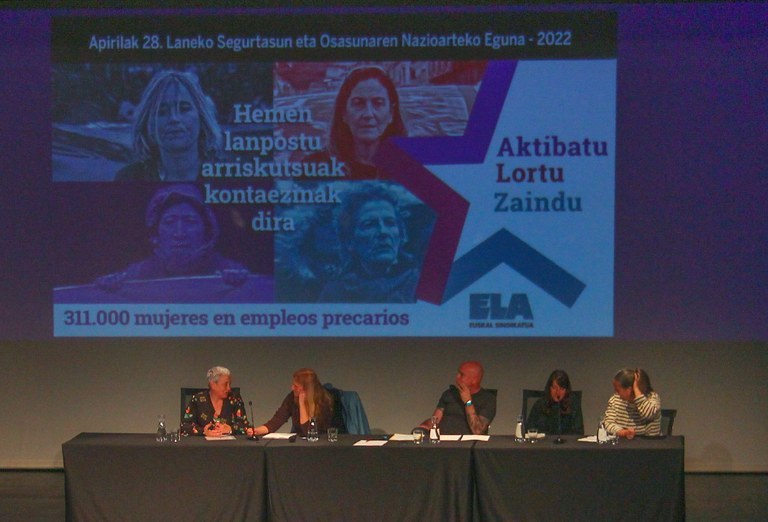#April28: “The greater amount of temporary work, part-time contracts or poverty suffered by women have an impact on their health and they demand a different approach”

ELA has marked the 2022 World Day for Safety and Health at Work with a double format. First, with an internal training day, at La Alhóndiga in Bilbao, in which around 400 trade union delegates participated. Following this, a demonstration took place with the majority trade union from Moyúa to the seat of the Basque Government, at Gran Vía 85, where a floral offering was laid down in tribute to the people who have died in accidents at work over the previous year.
In her intervention during the training day, Leire Heredia, from the Health and Safety at Work Department, demanded the need for a gender approach to be given to health and safety at work in order to bring an end to the risks that are specifically suffered by women. “The gender divide on today’s work market means that male-dominated and female-dominated sectors are created, where the risks are completely different and are treated differently. The data shows that men and women do not suffer from the same pathologies and they are also not subject to the same risks. The higher degree of temporary and part time work or the poverty suffered by women also has an impact on their health and this requires its own studies.”
Accordingly, she affirmed that “muscle and bone disorders caused by forced posture, repetitive movements and/or manual handling of loads; chemical and biological risks related to exposure in sectors such as cleaning, healthcare and social-health; psychosocial risk factors derived from bad organisation at work, which can derive in abuses of authority, inappropriate behaviour, amongst others, or violence against women at work, physical, psychological, sexual violence or for gender reasons, are risks that women suffer from and that must be eradicated in the work centres.”
After paying tribute to those who died in accidents at work, Peio Igeregi, head of ELA’s Health at Work Area insisted on the idea that job insecurity kills. “The fear of losing the contract, the lack of training, outsourcing, in short, the employers who give insecurity to our lives kill, they are killing us,” he denounced.
This, amongst other reasons, is behind the campaign against job insecurity that the trade union is carrying out, because “the 541,600 insecure jobs that we calculate exist in Hego Euskal Herria mean a risk of death.” “Carrying out this campaign is putting health at the centre, both directly and indirectly and at the same time, giving priority to the insecurity that women in particular suffer from is, also a way to fight against the gender gaps,” the trade union representative affirmed.
At another moment of his speech, Igeregi emphasised that to die at work is not a question of bad luck, but rather a question of the employer’s choice to make the lives of the working class insecure and of a political class that serves economic power. “Today we will see and we will listen to a great deal of hypocrisy. They will talk to us about the importance of prevention, collaboration, public involvement and other lies. Empty words. For years we have been asking for the number of inspectors to be doubled, to bring us up to the European average, but they do not do it, there is no political willingness to do this,” he denounced.
“For this reason’, he concluded, ‘what the politicians are not going to do, what the employers do not want to do, we have to do ourselves. We have to bring out all the job insecurity existing in the companies and sectors and face up to the exploiters. To do this, the best contribution that we can make is to go back to our jobs tomorrow and fill out a map of job insecurity,” he requested of those present.
In this event, delegates from different female-dominated sectors also took part, relating their experiences regarding the invisibility of their specific health at work problems and they denounced the situation of harassment that many companies attempt to hide.
A joint demonstration
Subsequently, the ELA delegates directed their steps towards the Moyúa Square, in Bilbao, where they joined representations from the following trade unions: LAB, ESK, STEILAS, Etxalde and Hiru. Together, they marched to the seat of the Basque Government to denounce, once again, the fact that job insecurity continues to kill and make workers ill. Likewise, they made a floral offering as a tribute to the workers who died the previous year.
In spite of the drop in work activity due to the cutbacks and to Covid, in Hego Euskal Herria accidents at work continue to rise at an alarming rate: in 2021 there was an increase in fatal accidents at work of 10.2% in the Basque Autonomous Community and 16.7% in Navarra. Last year at least 68 people died while working: 48 in the BAC and 20 in Navarra and this year 20 have already died – 17 in the BAC and 3 in Navarra.
Regarding occupational diseases, we continue to denounce the underreporting in the official statistics. In Hego Euskal Herria, for example, at least 17 have died due to asbestos-related diseases.
Mutual societies and companies are the main bodies responsible for this situation. However, in view of the bad practices of the prevention services and of the mutual societies, institutions do not carry out the necessary controls and take the required steps. More human resources are needed, for example doubling the amount of inspectors.
For this reason, today we have taken to the streets to denounce the fact that work continues to make workers ill and die and if preventive steps are not guaranteed, thousands of workers will continue to work without sufficient protection, particularly those who are in the most insecure jobs.
